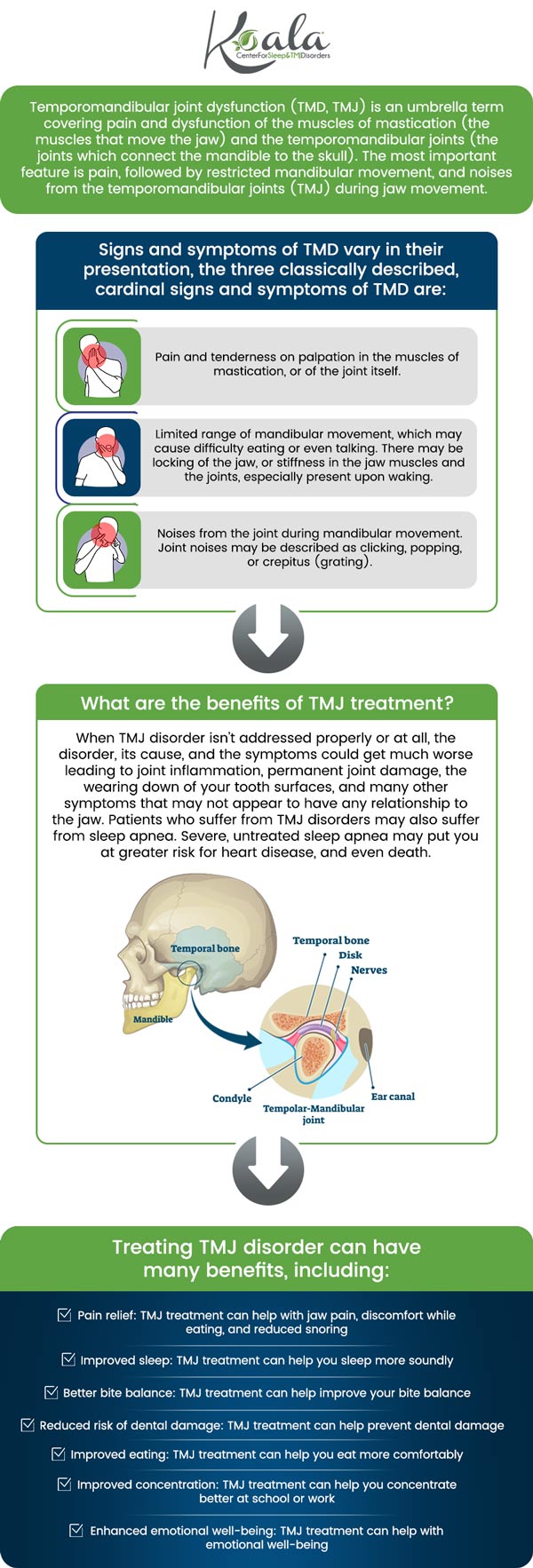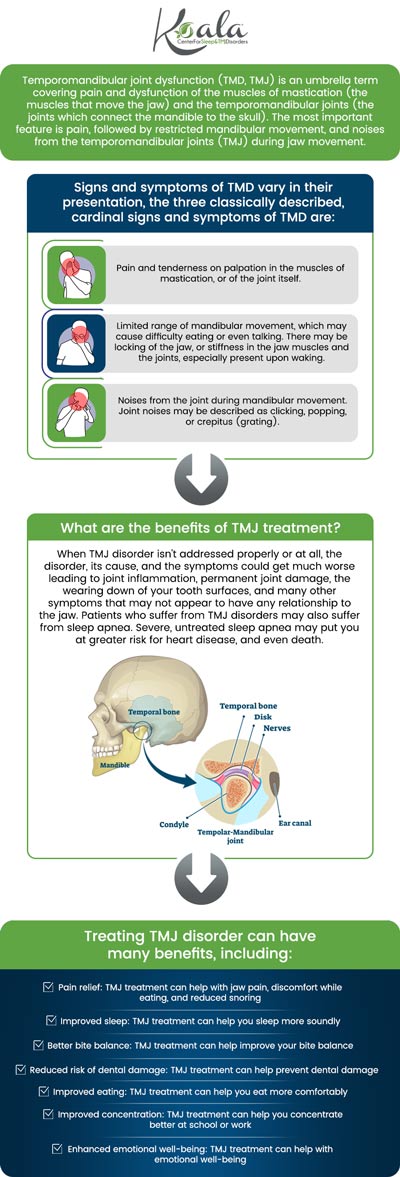Non-Invasive TMJ Treatment in El Paso, TX
Are you struggling with orofacial pain caused by a TMJ disorder/TMD? Our non-invasive treatment strategies can help! Our specialists at Koala® Center for Sleep & TMJ Disorders in El Paso, NY, provide comprehensive, personalized care for patients struggling with temporomandibular joint disorder. For more information, contact us or book an appointment online. We are conveniently located at 6901 Helen of Troy, Ste D-2 El Paso, TX 79911.


Table of Contents:
What are the symptoms of TMJ disorder?
How is TMJ disorder diagnosed?
Is non-invasive treatment for TMJ really effective?
Why should I see a neuromuscular dentist?
You deserve the very top medical care when it comes to your comfort and health. At Koala® Center for Sleep & TMJ Disorders, our skilled doctors and experienced dental professionals can provide you with a personalized treatment plan that will help you overcome your worst TMJ disorder symptoms so you can eat your favorite foods without worry and enjoy the benefits of less tension and anxiety.
There are a multitude of different symptoms a person may experience if they develop TMJ disorder. Some of the most obvious symptoms include soreness or pain that radiates into the face from the jaw, clicking in the jaw as it opens or closes, as well as reduced range of motion in the jaw. Patients with TMJ can also develop ringing in the ears, difficulty sleeping, tingling in their fingertips, and chronic migraines or headaches. Some patients will even begin feeling anxious or depressed as a result of their TMJ and the sleeplessness it can cause. If you have any of these symptoms or notice that you are suddenly having difficulty chewing tough foods or swallowing at mealtime, it is time to speak with an experienced physician about your options for treatment.
The first step in diagnosing TMJ is to undergo a physical examination where your doctor will establish the extent of your condition by observing your jaw’s range of motion and checking for areas of tenderness and pain. This can help both you and your doctor understand where the pain in your face is emanating from and provide important insight into the underlying cause of your condition, as well as how to Top approach your treatment. X-rays, CAT scans, or MRIs can also provide important information to your doctor regarding the health and function of the actual joint. Some patients with TMJ will experience pain because the disk inside the temporomandibular joint has degenerated or shifted out of place, and the only way to see this is for you to undergo a digital imaging test. When you choose a doctor to discuss your TMJ disorder symptoms with, it is important to find one who has experience working with patients who have similar symptoms because an inexperienced physician may not realize that all of your symptoms are indicative of the same medical issue. The doctors at Koala® Center for Sleep & TMJ Disorders have a wide range of experience providing effective care for patients with TMJ.
Our oral appliance therapy is one of the most effective treatment options available anywhere for patients struggling with TMJ disorder symptoms. Our dental devices are custom-made for each patient, so they are exceptionally comfortable and support every patient’s natural alignment and anatomy. Oral appliance therapy is a proven method for treating the chronic pain and tension of TMJ by relying on the body’s own ability to heal and supporting your jaw in its optimum resting position in order to allow for relaxation of the muscles that can cause chronic orofacial pain and make it difficult to enjoy your favorite foods.
Neuromuscular dental professionals specialize in the diagnosis and treatment of TMJ disorders. They use a holistic approach that takes into account the complex relationship between the teeth, jaw, muscles, and nerves of the face and neck. A few reasons why you should consider seeing a neuromuscular dentist for your TMJ disorder include:
– Comprehensive evaluation – Neuromuscular dentists use advanced technology, such as electromyography (EMG) and computerized mandibular scanning (CMS), to evaluate the function of the jaw and surrounding muscles. This allows them to identify underlying problems that could be contributing to your TMJ disorder, such as muscle tension or misalignment of the teeth and jaw.
– Personalized treatment – Neuromuscular dentists can develop personalized treatment plans to address each patient’s unique needs. This often involves a combination of techniques, such as physical therapy and custom-fitted orthotics, to properly reposition the teeth and jaw.
– Long-lasting pain relief – By professionally addressing TMJ disorder, a neuromuscular dentist can provide long-lasting relief from uncomfortable symptoms. This will improve your quality of life and help you avoid more invasive treatments, such as surgery.
– Improved overall dental health – TMJ disorder often has a negative impact on general dental health, causing problems such as tooth wear and sensitivity. By addressing these issues and improving the function of your jaw and surrounding muscles, a neuromuscular dentist can enhance your overall dental health and prevent future problems.
Overall, there are many reasons why you should see a neuromuscular dentist for TMJ disorder treatment. If you want to alleviate frustrating and uncomfortable symptoms, contact our clinic today.
Treating TMJ & TMD pain using neuromuscular dentistry
One of the key principles of neuromuscular dentistry is to achieve a relaxed state of the muscles surrounding the jaw joint. This reduces the inflammation and pain caused by TMJ disorders. Jaw joint relaxation can be accomplished using a variety of techniques, such as trigger point injections, massage therapy, and a custom-fitted mouthguard.
Before treatment, the neuromuscular dentist will perform a thorough evaluation of your jaw and surrounding muscles using state-of-the-art technology. Once the underlying issues have been identified, a personalized treatment plan will be developed to target your symptoms and improve your oral health.
Neuromuscular dentistry offers a comprehensive treatment approach to TMJ/TMD discomfort. By addressing the underlying issues that cause your symptoms, a neuromuscular dentist can provide long-lasting pain relief. If you are experiencing TMJ/TMD symptoms, our knowledgeable team is here to help you.
The science behind TMJ & neuromuscular dentistry
Neuromuscular dentistry is a highly effective approach to treating TMJ pain and discomfort. This method is based on scientific principles and research. Neuromuscular dentistry uses electromyography (EMG) to evaluate the function of the jaw and surrounding muscles. EMG measures the electrical activity of the muscles during various activities, such as chewing and speaking. This allows the neuromuscular dentist to easily identify any abnormal muscle activity or tension that may trigger TMJ symptoms.
Another innovative tool used in neuromuscular dentistry is computerized mandibular scanning (CMS), which creates a 3D model of the jaw and surrounding structures. This allows the specialist to evaluate the alignment of the teeth and jaw and identify any areas of dysfunction. Furthermore, neuromuscular dentistry considers the role of the nervous system in TMJ. The trigeminal nerve, which controls sensation in the face and motor function of the jaw muscles, plays a key role in the development and progression of TMJ. By understanding the relationship between the nervous system and the jaw muscles and joints, neuromuscular dentists can develop effective treatment strategies.
Overall, the science behind TMJ and neuromuscular dentistry is based on a comprehensive understanding of the anatomy and function of the teeth, jaw, muscles, and nerves of the face and neck. Neuromuscular dentists can provide long-lasting relief from TMJ pain by using advanced technology and a holistic approach to treatment.
For more information, call us today to book an appointment with our snoring treatment doctor, or visit our clinic conveniently located at 6901 Helen of Troy, Suite D-2, El Paso, TX 79911. We serve patients from El Paso TX, Fort Bliss TX, Canutillo TX, Vinton TX, and Northeast El Paso TX. We look forward to serving you!

Additional Services You May Need
▸ KoalaKIDZzz®
▸ Sleep Apnea
▸ Snoring
▸ TMJ Disorder
▸ Fatigue
▸ Sleep Disorders
▸ Weight Loss
▸ CPAP Alternative
▸ Oral Appliances




